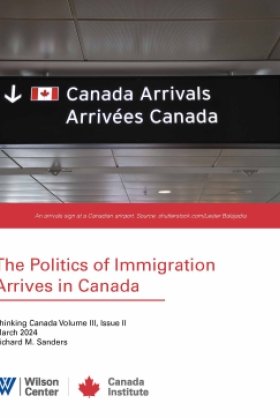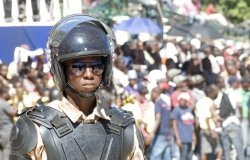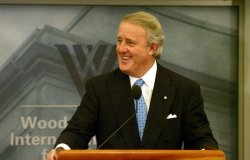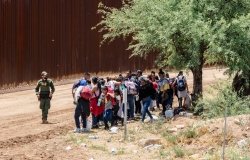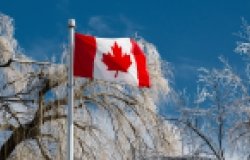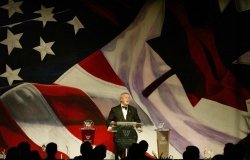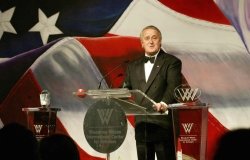New Book Discussion -- <i>Academic Freedom in the Wired World: Political Extremism, Corporate Power and the University</i>
Robert O'Neil, Professor of Law Emeritus and University President Emeritus, and Director, Thomas Jefferson Center for the Protection of Free Expression, University of Virginia; commentators Ann H. Franke, President, Wise Results LLC; Stephen Joel Trachtenberg, President Emeritus and University Professor of Public Service, George Washington University.
Overview
Robert O'Neil, Professor of Law Emeritus and University President Emeritus, and Director, Thomas Jefferson Center for the Protection of Free Expression, University of Virginia; commentators Ann H. Franke, President, Wise Results LLC; Stephen Joel Trachtenberg, President Emeritus and University Professor of Public Service, George Washington University.
Robert O'Neil raised a number of questions about academic freedom during a discussion, organized by the Division of United States Studies, of his Academic Freedom in the Wired World. Why, he asked, do universities deserve the protection of academic freedom? If universities do merit academic freedom, should that freedom be extended beyond faculty members to other university employees such as laboratory technicians and librarians? Is there any point to protecting faculty speech that is not only deeply offensive but unsound scholarship? or speech that is demonstrably false? Is it only speech in a faculty member's field of expertise that should be protected, or should speech outside a professor's field be equally protected?
O'Neil addressed the questions by asserting that free and open debate is essential to the pursuit of knowledge. Academic freedom is accorded to faculty members because they, the people who do research and publish, are singularly at risk. They must nonetheless be held accountable for speech that is unsound from a scholarly perspective. The question of when to intervene depends on the professor's discipline. A geographer who argues that the world is flat, for example, does not deserve the protection of academic freedom, because such a statement is evidence of incompetence.
The academic freedom of students as opposed to that of faculty members presents another conundrum. When a University of Utah drama student refused to play an assigned role on the grounds that it included language she could not utter because of her religion, the drama program faculty refused to accommodate her, and she charged in federal court that her freedom to speech and to the practice of her religion had been infringed (Axson-Flynn v. Johnson, 2001). The faculty argued that requiring students to read scripts as written helped prepare them for acting careers, and that the faculty's academic freedom included the right to judge how best to teach in its area. The case eventually was settled, and the question of where the right of academic freedom lies in such situations remains unclear.
Challenges to academic freedom seem to be increasing, and O'Neil urged academics to work together to confront them. Those on the "academic left" cannot afford to miss opportunities to collaborate with the "academic right." The academic community must be more assertive about opposing legislation that, for example, mandates "balance" in the curriculum or in the classroom. Associations that accredit universities and colleges must be more protective of academic freedom. At the same time, academics should be stronger in their condemnation of malfeasance and misuse of academic freedom. Above all, O'Neil asserted, the right of academic freedom should not be taken for granted.
Ann Franke found many reasons to feel encouraged about the future of academic freedom in the United States, but she noted that the challenges to it cannot be ignored. She mentioned attacks on academic freedom in the name of balance and diversity, such as the movement to teach "scientific creationism" or "intelligent design" alongside evolution. The majority of teachers in university and college classrooms are now adjuncts or other non-tenured faculty, lacking adequate protection for their speech. The federal government has excluded reputable foreign scholars from entering this country to speak and teach on campuses, denying students and faculty alike the benefit of their thinking. Recent court decisions have failed to give protection to public employees' work-related speech – a matter of particular concern for teachers in public institutions. The pervasiveness of the media means that the speech of an academic can generate a greater backlash than it did in the past.
At the same time, the advent of numerous avenues for communication, such as the Internet, means that media can be useful to academic freedom. The Internet provides an unfettered forum for communication, offers a public medium to counter offensive material, and provides a platform for an international exchange of ideas. The widespread coverage of censorship in other countries has made the public more aware of the dangers of stifling speech.
Stephen Tratchtenberg asserted that academic freedom in the United States is alive and well. He pointed to the example of Ward Churchill, a professor of ethnic studies at the University of Colorado, who said publicly that American policies were responsible for the tragedy of 9/11 and called the inhabitants of the World Trade Center "little Eichmanns." His University supported his right to express his controversial position. Trachtenberg too urged that faculty members take more responsibility for dealing with misconduct and abuses of academic freedom, rather than expecting administrators to deal with the issue, and he also called for reexamining the parameters of academic freedom in light of new technologies. Referring to Urofsky v. Gilmore (1999), in which Virginia professors unsuccessfully challenged a ban on the use of university computers to access sexually explicit sites they considered relevant to their teaching and research, Tratchtenberg suggested that perhaps not all professors need access to all Internet sites. He nonetheless agreed with the other speakers that challenges to academic freedom do exist and that, for the sake of the knowledge on which we all depend, it is incumbent upon the academic community to be alert and to protect academic freedom against threats both in the present and in the future.
Division of U.S. Studies
Thank you for your interest in this event. Please send any feedback or questions to our Events staff.


